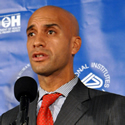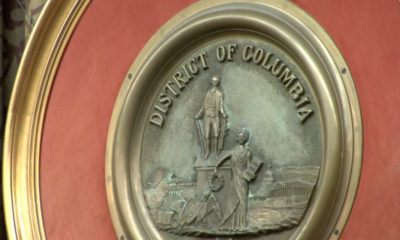Local
Activists call on Fenty to ‘restore’ police liaison unit
Letter to mayor cites recent anti-LGBT attacks

Several local LGBT organizations have sent Mayor Adrian Fenty an open letter asking him to overrule the city’s police chief, Cathy Lanier, by directing her to upgrade the headquarters staff at the police department’s Gay & Lesbian Liaison Unit.
Gays and Lesbians Opposing Violence, the D.C. Center for the LGBT Community, the Gay and Lesbian Activists Alliance, and the Gertrude Stein Democratic Club cited in the Aug. 26 letter a recent surge in anti-LGBT assaults in the city as demonstrating the need for strengthening the GLLU through an expanded staff.
“In light of this continuing history of violence against members of our community, we seek your immediate attention to fully restore the staffing levels of the GLLU to six full-time officers,” the groups said in the letter.
“Further, we ask that the unit be led by a full-time officer devoted to these duties with the authority to report directly to Chief Lanier. It is our hope that a restored GLLU will serve as a more effective liaison between the LGBT community and MPD,” the letter says.
The letter emerged from an Aug. 26 town hall meeting on anti-LGBT violence sponsored by the D.C. Center. Several people attending the meeting expressed support for a suggestion by gay activist Peter Rosenstein that activists stage a sit-in protest in Fenty’s office to dramatize the need for immediate action on his part to strengthen the GLLU.
Rosenstein said this week that he has no immediate plans for a mayoral protest or sit-in but said such an action would be considered sometime later.
GLOV co-chairs Kelly Pickard and Joe Montoni briefed town hall meeting attendees on some of the recent incidents of anti-LGBT violence, including about a half-dozen incidents in the Dupont Circle area near several gay bars. The two said they were especially troubled over the murder last month of gay federal worker Delando King, who was stabbed to death in his apartment near Massachusetts Avenue and 10th Street, N.W.
Police have charged a 24-year-old D.C. man with first-degree murder in connection with the case, and court documents filed by police say King appears to have invited his attacker home after meeting him in a gay bar.
GLOV co-chair Montoni said the group believes King’s murder should be listed as a hate crime, even though police have said the motive appears to have been robbery. GLOV praised police investigators for working with the GLLU to make an arrest in the case within a week of the murder.
The GLLU currently has four full-time officers, an increase from two years ago, when the unit’s staff dropped to just one or two officers due to attrition and a decision by Lanier to restructure and decentralize it.
Lanier has said budget cuts and the need for more officers on street patrol duty forced her to reduce the number of officers at the GLLU’s headquarters office in Dupont Circle from its high point in 2007 of six full-time officers and a full-time sergeant who served as its supervisor. The current GLLU supervisor, Sgt. Carlos Mejia, divides his duties between the GLLU and the department’s Latino Liaison Unit.
With the backing of Fenty, Lanier decentralized the GLLU and three other specialized police units working with the Latino, Asian American, and deaf and hard of hearing communities by establishing affiliate members of the units in each of the department’s seven police districts.
Officials with GLOV and other LGBT activists have expressed general support for the affiliate program, in which officers assigned to regular patrol duties are trained to respond to calls involving LGBT-related crimes. Lanier said there are currently about a dozen GLLU affiliate members in addition to the four full-time members.
But GLOV and other local LGBT groups have expressed concern that the affiliate members don’t have the time or expertise to handle all of the LGBT-related calls for police help, including calls related to hate crimes.
“Having affiliate officers trained to recognize and respond to LGBT crimes in every district is admirable in intent,” the groups said in their letter to Fenty. “In practice, however, not having officers dedicated to the GLLU full-time has led to, in our opinion, diminished effectiveness in recognizing and responding to bias crimes. We ask that you fully restore staffing to the GLLU and grant the officer in charge with direct reporting to Chief Lanier.”
The mayor’s office did not respond to a request for comment by press time.
In an interview with the Blade two weeks ago, Fenty said he has full confidence in Lanier’s handling of the GLLU restructuring, saying she has succeeded in reducing overall crime rates in the city during her tenure as chief.
“You want law enforcement putting together strategy for keeping people safe,” Fenty said. “You don’t want civilians and you especially don’t want politicians to be the ones who are developing those strategies. And I think Chief Lanier has done a great job doing that.”
District of Columbia
D.C. police arrest man for burglary at gay bar Spark Social House
Suspect ID’d from images captured by Spark Social House security cameras

D.C. police on Feb. 18 arrested a 63-year-old man “of no fixed address” for allegedly stealing cash from the registers at the gay bar Spark Social House after unlawfully entering the bar at 2009 14th St., N.W., around 12:04 a.m. after it had closed for business, according to a police incident report.
“Later that day officers canvassing for the suspect located him nearby,” a separate police statement says. “63-year-old Tony Jones of no fixed address was arrested and charged with Burglary II,” the statement says.
The police incident report states that the bar’s owner, Nick Tsusaki, told police investigators that the bar’s security cameras captured the image of a man who has frequently visited the bar and was believed to be homeless.
“Once inside, the defendant was observed via the establishment’s security cameras opening the cash register, removing U.S. currency, and placing the currency into the left front pocket of his jacket,” the report says.
Tsusaki told the Washington Blade that he and Spark’s employees have allowed Jones to enter the bar many times since it opened last year to use the bathroom in a gesture of compassion knowing he was homeless. Tsusaki said he is not aware of Jones ever having purchased anything during his visits.
According to Tsusaki, Spark closed for business at around 10:30 p.m. on the night of the incident at which time an employee did not properly lock the front entrance door. He said no employees or customers were present when the security cameras show Jones entering Spark through the front door around 12:04 a.m.
Tsusaki said the security camera images show Jones had been inside Spark for about three hours on the night of the burglary and show him taking cash out of two cash registers. He took a total of $300, Tsusaki said.
When Tsusaki and Spark employees arrived at the bar later in the day and discovered the cash was missing from the registers they immediately called police, Tsusaki told the Blade. Knowing that Jones often hung out along the 2000 block of 14th Street where Spark is located, Tsusaki said he went outside to look for him and saw him across the street and pointed Jones out to police, who then placed him under arrest.
A police arrest affidavit filed in court states that at the time they arrested him police found the stolen cash inside the pocket of the jacket Jones was wearing. It says after taking him into police custody officers found a powdered substance in a Ziploc bag also in Jones’s possession that tested positive for cocaine, resulting in him being charged with cocaine possession in addition to the burglary charge.
D.C. Superior Court records show a judge ordered Jones held in preventive detention at a Feb. 19 presentment hearing. The judge then scheduled a preliminary hearing for the case on Feb. 20, the outcome of which couldn’t immediately be obtained.
District of Columbia
Judge rescinds order against activist in Capital Pride lawsuit
Darren Pasha accused of stalking organization staff, board members, volunteers

A D.C. Superior Court judge on Feb.18 agreed to rescind his earlier ruling declaring local gay activist Darren Pasha in default for failing to attend a virtual court hearing regarding an anti-stalking lawsuit brought against him by the Capital Pride Alliance, the group that organizes D.C.’s annual Pride events.
The Capital Pride lawsuit, initially filed on Oct. 27, 2025, accuses Pasha of engaging in a year-long “course of conduct” of “harassment, intimidation, threats, manipulation, and coercive behavior” targeting Capital Pride staff, board members, and volunteers.
In his own court filings without retaining an attorney, Pasha has strongly denied the stalking related allegations against him, saying “no credible or admissible evidence has been provided” to show he engaged in any wrongdoing.
Judge Robert D. Okum nevertheless on Feb. 6 approved a temporary stay-away order requiring Pasha to stay at least 100 feet away from Capital Pride’s staff, volunteers, and board members until the time of a follow-up court hearing scheduled for April 17. He reduced the stay-away distance from 200 yards as requested by Capital Pride.
In his two-page order issued on Feb. 18, Okun stated that Pasha explained that he was involved in a scooter accident in which he was injured and his phone was damaged, preventing him from joining the Feb. 6 court hearing.
“Therefore, the court finds there is a good cause for vacating the default,” Okun states in his order.
At the time he initially approved the default order at the Feb. 6 hearing that Pasha didn’t attend, Okun scheduled an April 17 ex parte proof hearing in which Capital Pride could have requested a ruling in its favor seeking a permanent anti-stalking order against Pasha.
In his Feb. 18 ruling rescinding the default order Okun changed the April 17 ex parte proof hearing to an initial scheduling conference hearing in which a decision on the outcome of the case is not likely to happen.
In addition, he agreed to consider Pasha’s call for a jury trial and gave Capital Pride 14 days to contest that request. The Capital Pride lawsuit initially called for a non-jury trial by judge.
One request by Pasha that Okum denied was a call for him to order Capital Pride to stop its staff or volunteers from posting information about the lawsuit on social media. Pasha has said the D.C.-based online blog called DC Homos, which Pasha claims is operated by someone associated with Capital Pride, has been posting articles portraying him in a negative light and subjecting him to highly negative publicity.
“The defendant has not set forth a sufficient basis for the court to restrict the plaintiff’s social media postings, and the court therefore will deny the defendant’s request in his social media praecipe,” Okun states in his order.
A praecipe is a formal written document requesting action by a court.
Pasha called the order a positive development in his favor. He said he plans to file another motion with more information about what he calls the unfair and defamatory reports about him related to the lawsuit by DC Homos, with a call for the judge to reverse his decision not to order Capital Pride to stop social media postings about the lawsuit.
Pasha points to a video interview on the LGBTQ Team Rayceen broadcast, a link to which he sent to the Washington Blade, in which DC Homos operator Jose Romero acknowledged his association with Capital Pride Alliance.
Capital Pride Executive Director Ryan Bos didn’t immediately respond to a message from the Blade asking whether Romero was a volunteer or employee with Capital Pride.
Pasha also said he believes the latest order has the effect of rescinding the temporary stay away order against him approved by Okun in his earlier ruling, even though Okun makes no mention of the stay away order in his latest ruling. Capital Pride attorney Nick Harrison told the Blade the stay away order “remains in full force and effect.”
Harrison said Capital Pride has no further comment on the lawsuit.
District of Columbia
Trans activists arrested outside HHS headquarters in D.C.
Protesters demonstrated directive against gender-affirming care

Authorities on Tuesday arrested 24 activists outside the U.S. Department of Health and Human Services headquarters in D.C.
The Gender Liberation Movement, a national organization that uses direct action, media engagement, and policy advocacy to defend bodily autonomy and self-determination, organized the protest in which more than 50 activists participated. Organizers said the action was a response to changes in federal policy mandated by Executive Order 14187, titled “Protecting Children from Chemical and Surgical Mutilation.”
The order directs federal agencies and programs to work toward “significantly limiting youth access to gender-affirming care nationwide,” according to KFF, a nonpartisan, nonprofit organization that provides independent, fact-based information on national health issues. The executive order also includes claims about gender-affirming care and transgender youth that critics have described as misinformation.
Members of ACT UP NY and ACT UP Pittsburgh also participated in the demonstration, which took place on the final day of the public comment period for proposed federal rules that would restrict access to gender-affirming care.
Demonstrators blocked the building’s main entrance, holding a banner reading “HANDS OFF OUR ‘MONES,” while chanting, “HHS—RFK—TRANS YOUTH ARE NO DEBATE” and “NO HATE—NO FEAR—TRANS YOUTH ARE WELCOME HERE.”
“We want trans youth and their loving families to know that we see them, we cherish them, and we won’t let these attacks go on without a fight,” said GLM co-founder Raquel Willis. “We also want all Americans to understand that Trump, RFK, and their HHS won’t stop at trying to block care for trans youth — they’re coming for trans adults, for those who need treatment from insulin to SSRIs, and all those already failed by a broken health insurance system.”
“It is shameful and intentional that this administration is pitting communities against one another by weaponizing Medicaid funding to strip care from trans youth. This has nothing to do with protecting health and everything to do with political distraction,” added GLM co-founder Eliel Cruz. “They are targeting young people to deflect from their failure to deliver for working families across the country. Instead of restricting care, we should be expanding it. Healthcare is a human right, and it must be accessible to every person — without cost or exception.”

Despite HHS’s efforts to restrict gender-affirming care for trans youth, major medical associations — including the American Medical Association, the American Academy of Pediatrics, and the Endocrine Society — continue to regard such care as evidence-based treatment. Gender-affirming care can include psychotherapy, social support, and, when clinically appropriate, puberty blockers and hormone therapy.
The protest comes amid broader shifts in access to care nationwide.
NYU Langone Health recently announced it will stop providing transition-related medical care to minors and will no longer accept new patients into its Transgender Youth Health Program following President Donald Trump’s January 2025 executive order targeting trans healthcare.




















